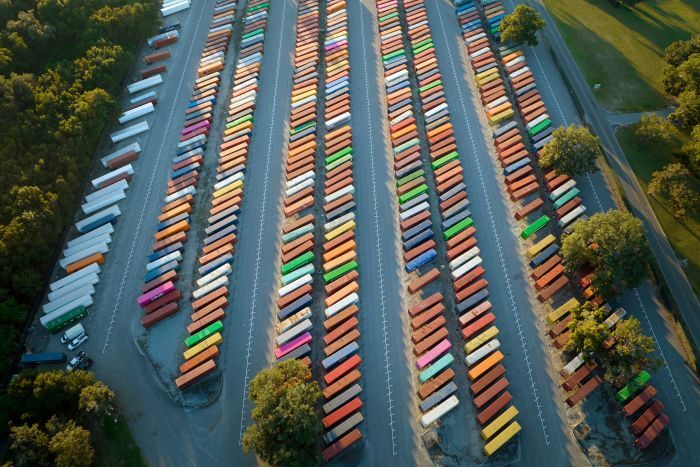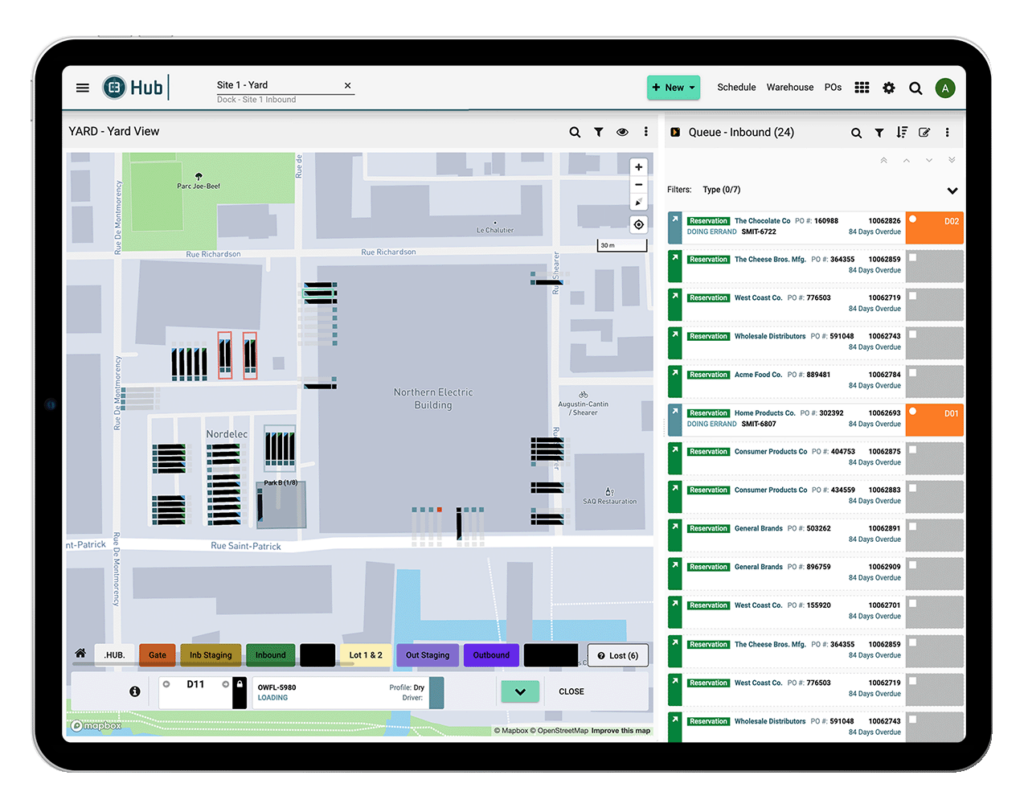How Advanced YMS Enhances Trailer Tracking

When operating large warehouses, visibility into yard operations and assets is crucial for performance tracking and simplified inventory management. With real-time visibility into where every trailer and asset is in the yard, businesses can reduce wasted time searching for "lost" trailers. The simplification of this one simple task can unlock great productivity for the company.
That’s where a good yard management system (YMS) comes in. It’s not just another piece of tech; it’s a strategic investment that can boost your operations. The key is finding a YMS built to give you the necessary visibility to keep things moving smoothly. With the right system in place, you can turn idle time in the yard into productive time on the road, speeding up throughput and making your entire supply chain work like a well-oiled machine.
The Importance of Trailer Tracking
But why does tracking of trailers matter? Considering yards are expansive, manually tracking and locating vehicles can be challenging. Trailer tracking is about optimizing every move for efficiency, with an aim to reduce idle time and ensure timely loading and unloading. If one trailer goes untraceable in busy yards, it can bring substantial operational delays, fuel wastages, demurrages, and labor costs. For example, yard personnel may spend hours searching for misplaced trailers, leading to productivity loss and delayed shipments.

Key Technologies for Trailer Tracking
There are many ways to ensure that the yard is well-equipped to track the trailers and keep them in a proper sequence for loading and off-loading. However, while multiple technologies exist, bringing them together for a seamless operation is an arduous task. This is where a good YMS can be of significant help. Modern yard management systems integrate a range of tools and technologies to enable precise trailer tracking.
So let us understand these tools and the benefits they offer:
1. GPS Tracking and Geofencing
Among the most crucial solutions for yard trailer tracking is GPS tracking. GPS-enabled trailers can be traced with pinpoint accuracy, giving yard managers a view of each trailer's placement on a single screen. Like air traffic control (ATC) monitors aircraft, yard operators can manage trailers efficiently in a yard.
GPS tracking gets even stronger when coupled with geofencing. Geofencing creates virtual boundaries around yard entry, dock zones, or parking lots. A notification could be set up whenever a trailer crosses these boundaries to notify yard managers of unplanned trailer arrivals or departures.
Benefits:
- Enables precise trailer location tracking.
- Reduces search time for trailers in large yards.
- Enhances security by alerting managers if a trailer exits the yard unexpectedly.
2. RFID Tags and Readers
RFID tags can be a good and cheaper alternative to GPS devices on trailers to track their movements. Although not as accurate as GPS tracking, RFID readers at strategic points around the yard can help locate the trailer.
This is quite similar to the RFID-based ID cards people use to access different parts of an office building. While the card does not let you pinpoint the exact location of a person, it can track the movement pattern. RFID allows rapid scanning of trailers to capture crucial information like trailer ID, entry & exit times, and other status information. RFID enables trailers to be instantly checked in and out of the yard, minimizing paperwork and manual logging.
Benefits:
- Automates data capture for trailer movements.
- Reduces human error in manual data entry.
- Provides quick visibility into trailer locations and statuses.
- Cheaper than GPS tracking
3. Sensors
Sensors take trailer tracking to a higher level, enabling real-time data on parameters outside the monitoring region, such as trailer temperature, humidity, door status, and load weight. Modern sensors are now IoT-based and beneficial for tracking fragile cargo like perishables, medicines, or electronics. IoT sensors enable yard managers to monitor trailers and react quickly if something is wrong to keep goods secure and in great shape.
Benefits:
- Monitors trailer conditions in real-time.
- Enables proactive response to potential issues.
- Improves compliance with regulatory requirements for sensitive goods.
4. Automated Gate Systems
Automated gate systems have sensors, cameras, and RFID readers that allow for simple check-in and check-out. The system reads the trailer ID whenever a trailer arrives at the gate and compares it with scheduled appointments or load assignments. It simplifies the entry and takes the manual labor from the process while ensuring that the correct trailers enter and leave the yard.
Benefits:
- Reduces wait times at entry and exit points.
- Minimizes paperwork and manual data entry.
- Enhances security by automatically verifying trailer details.
5. Advanced Analytics and Machine Learning
Modern YMS platforms have advanced analytics and machine learning capabilities, allowing companies to analyze trailer-tracking data and gain actionable insights. These systems can identify patterns, such as peak usage times, average trailer dwell times, and the most efficient routes within the yard. The YMS can also forecast trailer demand, anticipate bottlenecks, and optimize yard layout and resources using predictive analytics on top of the historical generated by it.
Benefits:
- Improves resource allocation based on data-driven insights.
- Reduces trailer dwell times and optimizes yard flow.
- Enables proactive decision-making for improved efficiency.

How YMS Transforms Trailer Tracking and Asset Visibility
Now that we've covered the tools involved in trailer tracking, let's look at how a modern yard management system leverages these technologies to revolutionize asset visibility and transform yard operations.
1.YMS provides Real-Time Visibility and Monitoring
A modern YMS gives yard managers a clear, real-time view of everything happening in the yard. Using a digital map interface, managers can instantly check the location, movement, and status of every trailer. No more running around or searching for “lost” trailers! With GPS and RFID alerts, trailers stay on track and don’t sit idle for too long, helping keep the yard running smoothly.
2.Automated Workflow Management
Gone are the days of manual check-ins, check-outs, and dock scheduling. A good YMS automates all these tasks and more, saving time and reducing errors. It handles trailer tracking, updates statuses automatically, and keeps workflows moving without constant human intervention. This means yard teams can focus on strategic work instead of being bogged down with routine tasks. Automation not only simplifies things but also boosts productivity and efficiency.
3.Improved Collaboration
A modern YMS makes teamwork in the yard a breeze. Drivers, yard staff, and warehouse teams can stay connected in real-time through the platform. For example, drivers can get instant instructions on where to park or which dock to use, cutting down on guesswork and reducing yard congestion. Everyone stays on the same page, making operations more efficient and stress-free.
4.Data-Driven Decision Making
One of the best parts of using a YMS is the treasure trove of data it collects. From GPS tracking and IoT sensors to RFID tags, the system gathers tons of useful insights about yard and trailer operations. Managers can spot inefficiencies, track performance trends, and make smarter decisions to get the most out of their assets. With these insights, it’s easier to cut costs, boost utilization, and keep the yard running like a well-oiled machine.
5.Better Security and Compliance
Trailer security is turning into a significant problem for sensitive or high-value cargo. Modern YMS provides access control with automated gate systems, geofencing, and real-time alerts. These features ensure authorized personnel only access trailers and can detect unauthorized movements. For regulated industries, YMS solutions also help maintain compliance by providing audit trails and documentation of trailer movements and conditions.
5 Benefits of Effective Trailer Tracking
So, by now, it is clear that, with so many features and visibility, tracking trailers with a modern YMS has numerous benefits. Here is a quick list of the top five:
-
Enhanced Efficiency: With real-time trailer location data, drivers and yard staff can be moved to the correct trailers faster, reducing idle times.
-
Improved Asset Sweating: Track trailer movements to identify unused or underused assets, allowing better asset allocation and reducing the need for excess trailers.
-
Reduced Detention and Demurrage Fees: Quicker turnarounds and prevent trailers from sitting idle, reducing detention costs.
-
Enhanced Security: Monitoring trailers in real-time allows companies to quickly detect and respond to any unauthorized movements or potential theft.
-
Overall Cost Advantages: With lower idle time, the cost of the operations can be optimized as fuel cost wastages, labor cost wastages, etc., all come down.
Build the Next-Gen Trailer Tracking with C3 Solutions
With high efficiency, visibility, and security at the cutting edge, modern yard management systems are reshaping how companies track and manage trailers better.
With such systems, yard managers will no longer need to perform repetitive jobs, and asset utilization can be improved easily. The final result is a more streamlined, less expensive to run, and resilient to disruptions yard that strengthens the overall supply chain.
C3 Solutions provides revolutionary YMS solutions to simplify, efficiently, and visibility yard management. With C3's technology expertise in yard management, your yard operations can achieve peak performance, even during high-demand periods.
Contact C3 Solutions today to discover how we can help you transform your yard management practices and stay ahead in ever-evolving logistics operations.<


